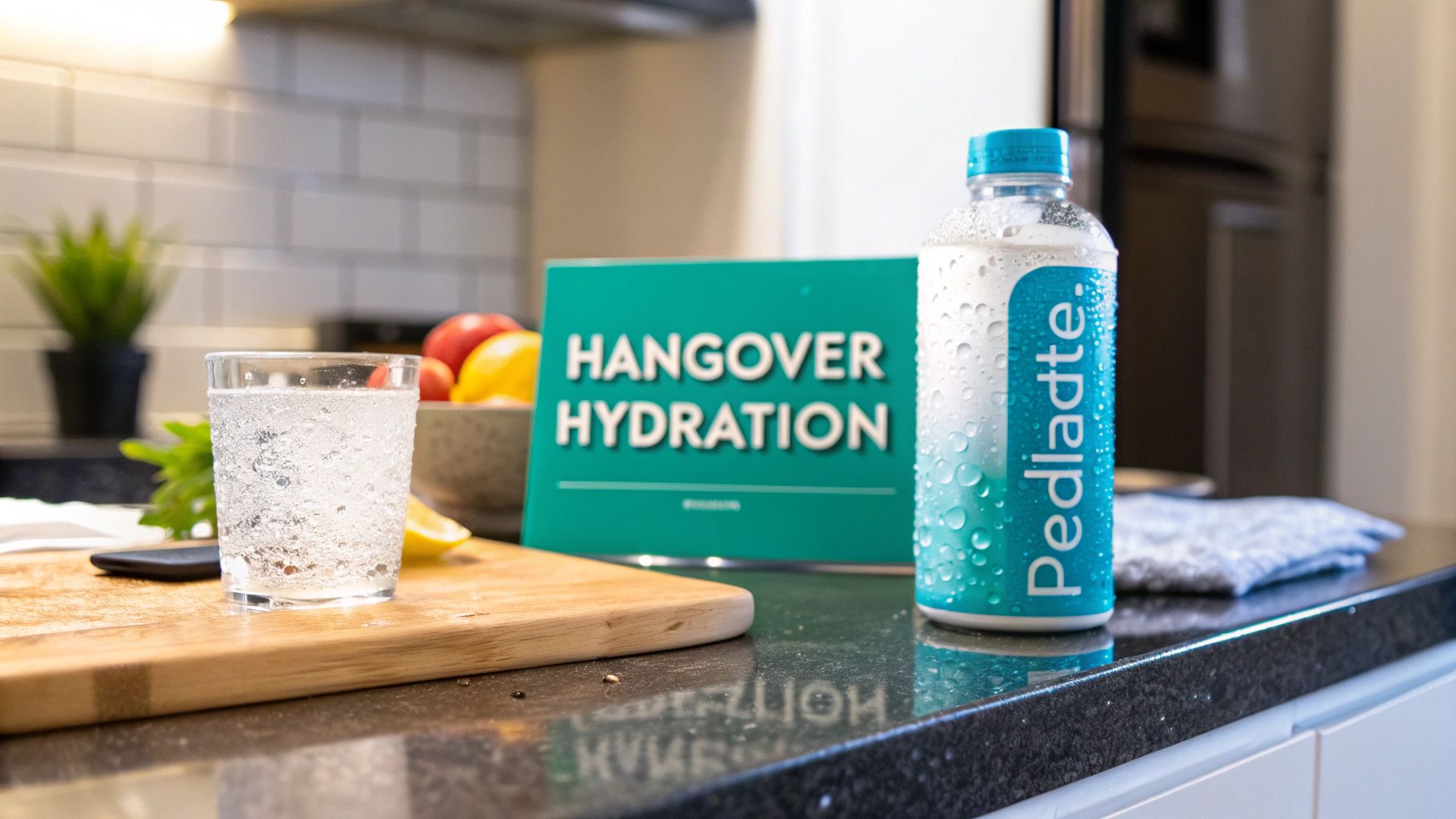

· By Annemarie
Is Pedialyte Good for a Hangover? The Real Story
So, is Pedialyte actually good for a hangover? Yes and no. It’s a fantastic tool for tackling the brutal dehydration that comes with a hangover, but it's not a magic bullet that erases all your sins from the night before. Its blend of electrolytes and a little bit of sugar helps your body rehydrate way more effectively than water alone, which is why it's become such a go-to for rough mornings.
Why Pedialyte Is a Go-To Hangover Helper
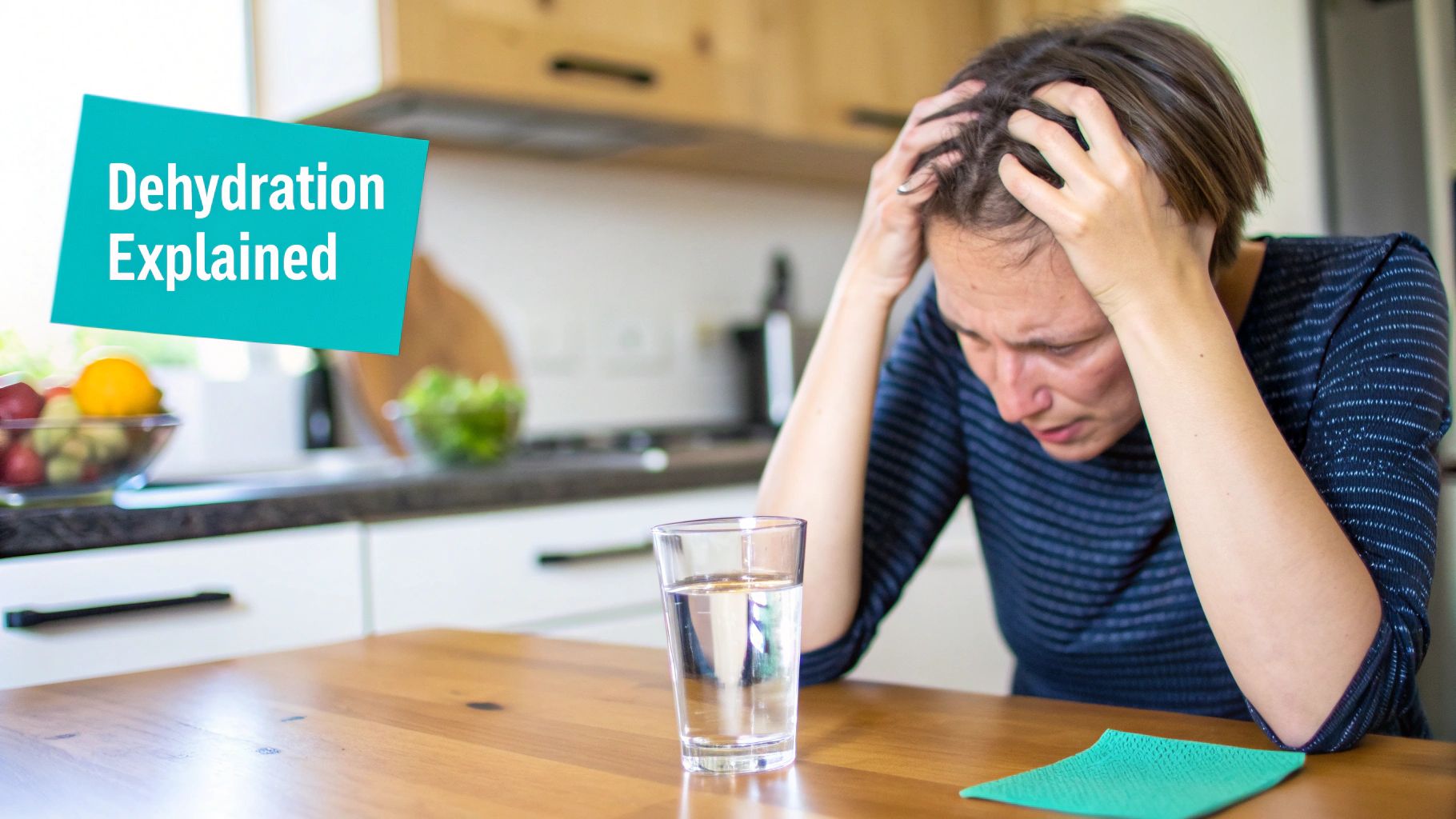
When you wake up feeling like you’ve been run over by a truck, your body is basically screaming for hydration. Alcohol is a diuretic, which is just a fancy way of saying it makes you pee out fluids and essential minerals. This is what leads to those classic hangover hits: the pounding headache, the fatigue, and that desert-in-your-mouth thirst.
This is where Pedialyte comes into the picture. It was originally made for dehydrated kids, so its entire formula is engineered for one thing: rapid rehydration. And let’s be real, hangovers are a massive issue—research shows nearly 75% of adults who drink have to deal with them.
While there’s no miracle cure, getting a handle on dehydration is half the battle. Pedialyte directly tackles this by restoring that lost balance of electrolytes. For a deeper dive into how it fits into public health discussions, you can check out advisory.com.
Think of your body after a night out like a smartphone on 1% battery. Water is like a standard, slow charger. Pedialyte is the fast-charging block and cable—it’s specifically designed to get you back to 100% as quickly as possible.
It essentially gives your body the exact tools it needs to get its fluid balance back in order, and it does it much faster than other drinks.
Hangover Rehydration Options at a Glance
When you're trying to rehydrate, you've got a few common choices. Here’s a quick breakdown of how they stack up when you're feeling the effects of a hangover.
| Hydration Source | Electrolyte Content | Sugar Content | Best For |
|---|---|---|---|
| Pedialyte | High | Low to Moderate | Rapid rehydration when you're seriously depleted. |
| Sports Drinks | Moderate | High | Post-workout recovery, but the high sugar can be a drawback for hangovers. |
| Water | Very Low | None | Everyday hydration, but less effective for replacing lost electrolytes. |
Ultimately, while sports drinks and water have their place, Pedialyte's formula is more specifically targeted for the kind of severe dehydration a hangover can cause. The lower sugar content is a big plus, as you don't want a sugar crash on top of everything else.
What Alcohol Actually Does to Your Body
To get why anyone would even reach for Pedialyte after a night out, you first have to understand what’s actually happening during a hangover. It's not just one thing. Think of it like a multi-car pile-up inside your body; a chain reaction of problems that leaves you feeling absolutely wrecked.
It all starts with dehydration, but that's just the tip of the iceberg. Alcohol is a diuretic, which is a fancy way of saying it makes you pee—a lot. It does this by messing with a hormone called vasopressin, whose job is to tell your kidneys to hang onto water. When alcohol shows up, vasopressin clocks out. Your kidneys go into overdrive, flushing out not just water but also essential electrolytes like sodium and potassium. That pounding headache and feeling like the room is spinning? That’s the first sign of this imbalance.
The Toxic Aftermath
But feeling thirsty is only part of the story. While you’re drinking, your liver is working overtime to break down the alcohol, and in the process, it creates a nasty byproduct called acetaldehyde. This stuff is way more toxic than the alcohol itself and it’s a major driver of inflammation throughout your entire body. It’s what’s behind the muscle aches, brain fog, and that general "I've been hit by a truck" feeling.
When acetaldehyde builds up faster than your body can get rid of it, it starts causing widespread cellular damage. This is a huge reason why a hangover feels so much worse than just being tired or dehydrated.
And to top it all off, alcohol completely sabotages your sleep. Sure, a drink might make you drowsy and help you conk out faster, but it slams the door on the deep, restorative stages of REM sleep. You might have been in bed for eight hours, but the quality is so terrible that you wake up feeling drained and exhausted.
- Dehydration: Caused by alcohol’s diuretic effect, which flushes out water and electrolytes.
- Acetaldehyde Buildup: A toxic byproduct from your liver that causes body-wide inflammation and damage.
- Poor Sleep Quality: Alcohol blocks the deep, restful sleep your body needs to actually recover.
When you see how these issues are all tangled together, it’s obvious why just chugging water won’t cut it. A real solution has to tackle a lot more than just fluid loss. If you want to dive deeper into the science, our full guide breaks down exactly what causes hangovers.
Why Pedialyte Outperforms Sports Drinks for Rehydration
When you’re staring down a hangover, grabbing the nearest rehydration drink feels like the obvious move. But not all fluorescent-colored liquids are created equal. While most people reach for a sports drink, Pedialyte actually has a huge scientific edge, especially for the kind of serious dehydration that comes from a night of drinking.
The real difference is what they were made for. Sports drinks are designed to refuel your body during exercise, which means they’re often loaded with sugar to give your muscles a quick energy boost. Pedialyte? It was engineered for one thing and one thing only: medical-grade rehydration. Its whole game is about getting fluids back into your system as fast as possible.
The Science of Superior Absorption
This isn't just marketing hype; it's straight-up physiology. Your body has a clever mechanism called the sodium-glucose cotransport system that pulls water and electrolytes into your cells. Think of it like a bouncer at a club—you can’t get in without the right combo. In this case, the combo is sodium and glucose (sugar).
Pedialyte’s formula nails this ratio perfectly. It has just enough sugar to get the "bouncer's" attention, opening the door so sodium and water can flood in quickly and effectively.
Pedialyte isn’t trying to give you energy. It's built to maximize how much fluid you absorb. By keeping the sugar low, it avoids a potential crash and puts all its focus on rehydrating your depleted body.
This is exactly why it feels like it works so well. It’s a targeted fix for getting hydrated fast, which is precisely what you need. You can dive deeper into other proven methods in our guide on the best way to rehydrate after drinking.
The numbers don't lie. Pedialyte has roughly twice the electrolytes of the big-name sports drinks, with about half the sugar. Many of those popular sports drinks pack so much sugar they can actually make dehydration worse—the absolute last thing you need when you're already feeling rough. This low-sugar, high-electrolyte combo makes it the clear winner for getting back on your feet.
How Pedialyte Became an Unlikely Hangover Star
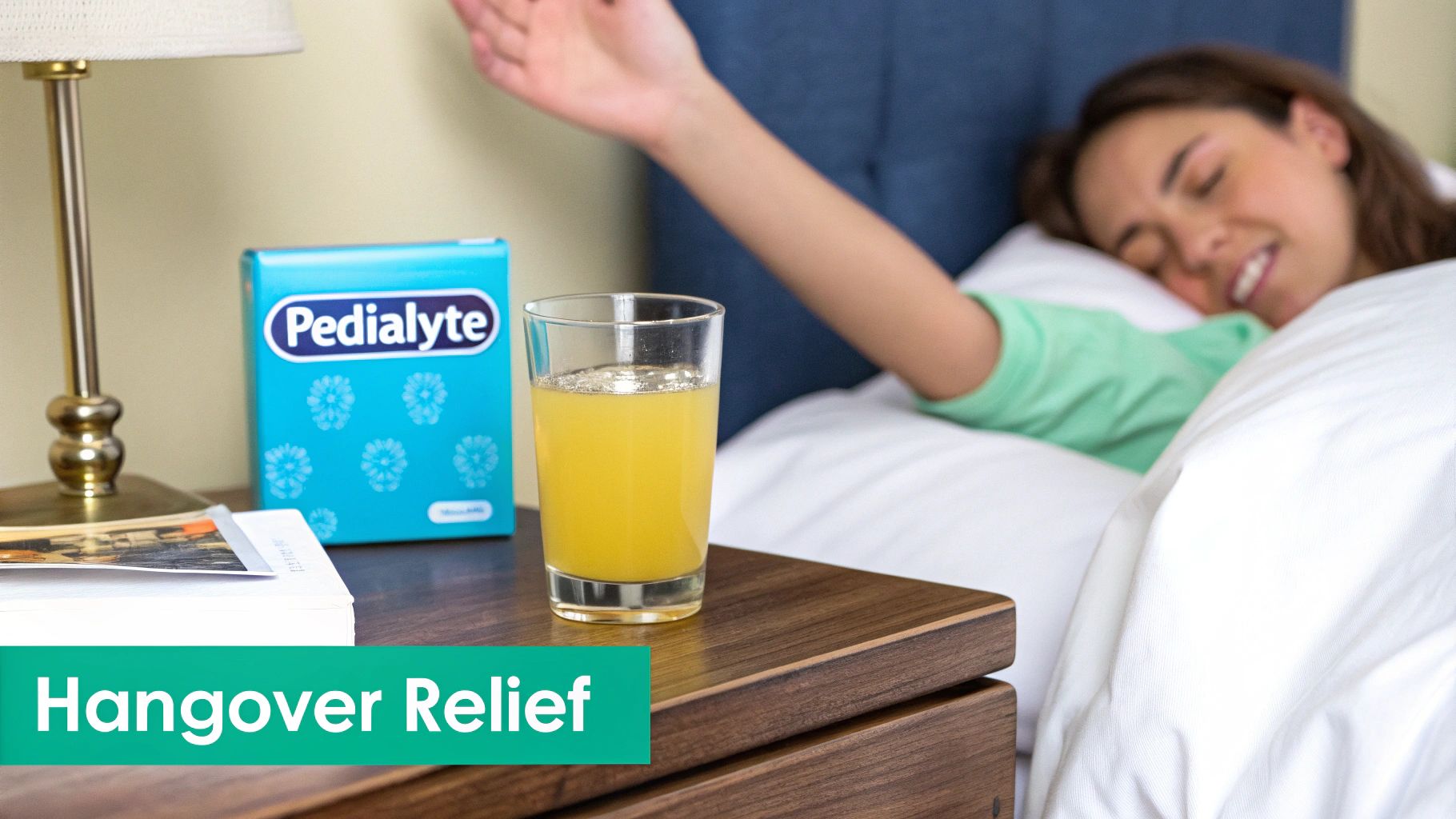
For most of its life, Pedialyte was stuck in the medicine cabinet, something you only bought for sick kids. Its leap from the pediatric aisle to the adult hangover survival kit is a wild story of word-of-mouth and a little celebrity magic. The funny thing is, the product never changed—just the people drinking it.
First developed back in the 1960s, Pedialyte was a straight-up medical solution for childhood dehydration. It was a serious product for a serious problem, a million miles away from late nights and morning-after regrets. And for decades, that was its entire identity.
The Word-of-Mouth Revolution
So how did the switch happen? It started quietly, with athletes and college students figuring out its rehydration powers on their own. They realized the same formula that helps a kid kick the flu could also tackle the dehydration from an intense workout… or a night of one too many drinks. This grassroots movement set the stage for a much bigger shift.
Then, social media threw gasoline on the fire. Around 2009, celebrities and influencers started openly shouting out Pedialyte as their secret weapon for hangovers. This unofficial endorsement went viral, confirming what a lot of people already suspected and introducing the idea to a massive new audience. You can get more of the story on this marketing shift on healthline.com.
Pedialyte didn't go looking for the hangover market; the hangover market found Pedialyte. Its effectiveness for one kind of dehydration made it the perfect, accidental solution for another.
This organic groundswell cemented its new reputation. Suddenly, adults were buying it in droves, not for their kids, but for themselves. The brand eventually got the memo and leaned into its new identity, even launching ad campaigns aimed at adults. And just like that, Pedialyte became an unlikely but trusted star in the world of hangover recovery.
Understanding What Pedialyte Cannot Fix
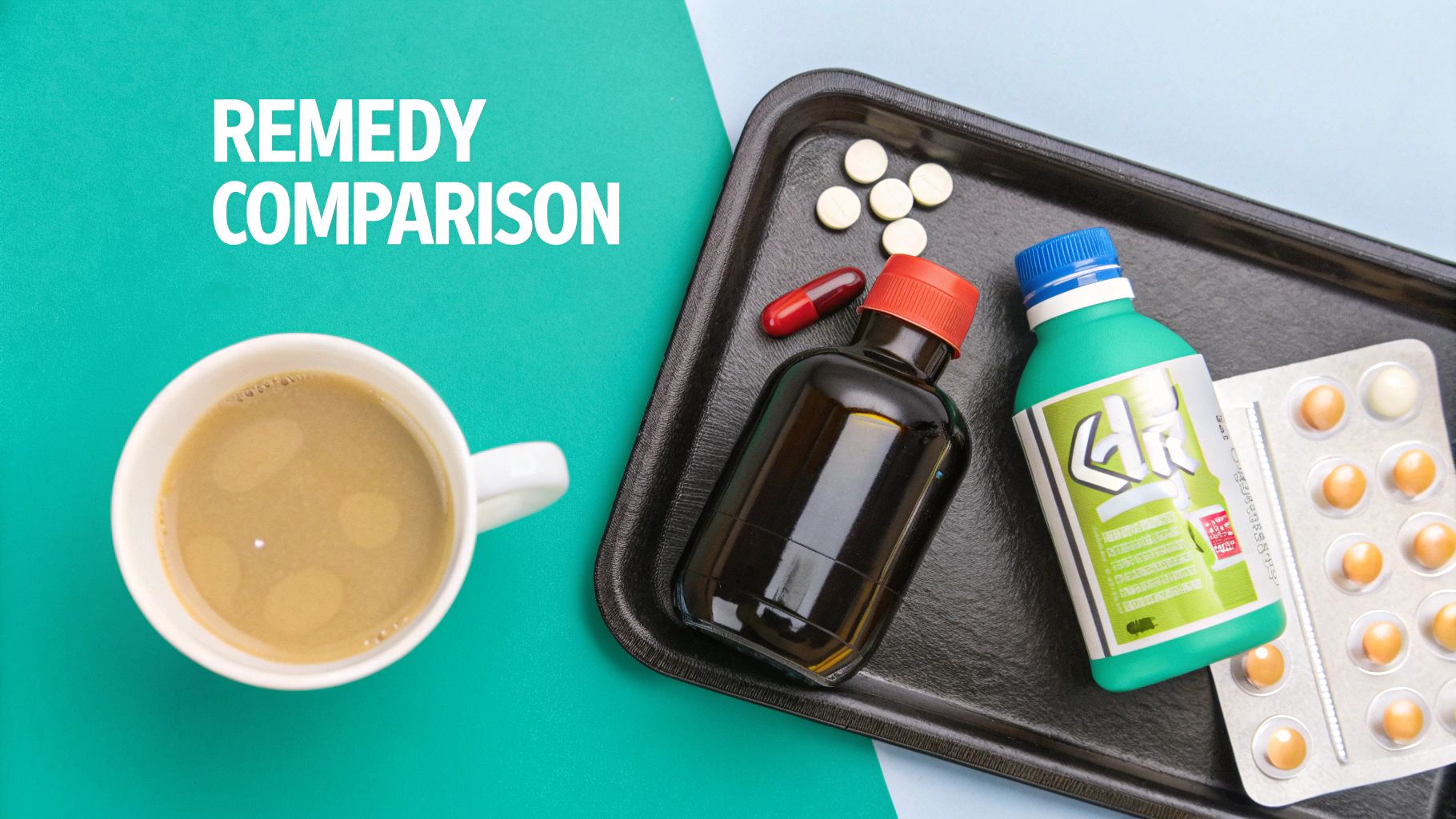
While Pedialyte is an absolute all-star at fighting dehydration, it's a mistake to see it as the entire team. A real hangover is a complex battle fought on multiple fronts, and Pedialyte only has the gear to tackle one of them. Thinking of it as a magical cure-all is a pretty common mistake.
The relief it gives you from a dehydration headache or that wiped-out feeling is legit. But its formula just wasn't built to take on the other villains behind your morning-after misery. The benefits of rehydration stop right where the other problems start, which is exactly why you might still feel awful even after chugging a whole bottle.
The Gaps in a Dehydration-Only Strategy
To actually beat a hangover, you need a game plan that addresses the full spectrum of symptoms. Pedialyte’s formula, for all its rehydrating power, simply isn't equipped to handle the other major issues caused by a night of drinking.
-
System-Wide Inflammation: Alcohol kicks off an inflammatory response all over your body, which is what leads to those general aches and that "I've been hit by a truck" feeling. Pedialyte contains zero anti-inflammatory ingredients to calm that down.
-
Toxic Acetaldehyde Buildup: As your liver breaks down alcohol, it creates a nasty, toxic compound called acetaldehyde. This stuff is a primary driver of hangover symptoms, and an electrolyte drink does absolutely nothing to help your body get rid of it faster.
-
Gastrointestinal Distress: Alcohol is a direct irritant to your stomach lining, causing that classic nausea and discomfort. Pedialyte can get fluids back in you, but it's not going to soothe an upset stomach or do anything to fight that queasy feeling.
Chugging Pedialyte is a great first step, but it’s kind of like putting a bandage on a broken arm. It helps with a surface-level problem but doesn’t fix the underlying damage causing most of the pain.
Recognizing these blind spots is the key to building a smarter recovery strategy. You can't expect one tool to fix every single problem, and that's okay. It just means you need a more complete approach to feel human again.
A Smarter Approach to Hangover Recovery
So, if Pedialyte only tackles the rehydration piece of the hangover puzzle, what does a complete fix actually look like? A truly effective strategy goes way beyond just dumping fluids back into your system. You need to target the multiple root causes of a hangover with a multi-pronged attack.
Modern recovery aids are built on this exact idea. They get that while chugging electrolytes is a decent start, it does absolutely nothing for the toxic acetaldehyde buildup, system-wide inflammation, or stomach misery that are also making you feel awful. To really fight back, you need more specialized tools in your corner.
Beyond Simple Rehydration
This is where specific, science-backed ingredients make all the difference. A comprehensive approach uses a team of components that work together to address the full spectrum of hangover symptoms.
- For Acetaldehyde Buildup: Ingredients like Dihydromyricetin (DHM) are brought in to help your liver break down that toxic acetaldehyde compound more efficiently, clearing it out of your system faster.
- For Nausea and Discomfort: Natural anti-inflammatories and stomach soothers, like Ginger, directly tackle that queasy feeling and calm your irritated digestive tract.
A complete hangover solution is like a skilled repair crew showing up after a storm. While one person patches the roof (rehydration), others are fixing the electrical systems (processing toxins) and clearing debris (reducing inflammation). One person can't do it all.
This infographic breaks down a simple way to decide which hydration method is best for your situation.
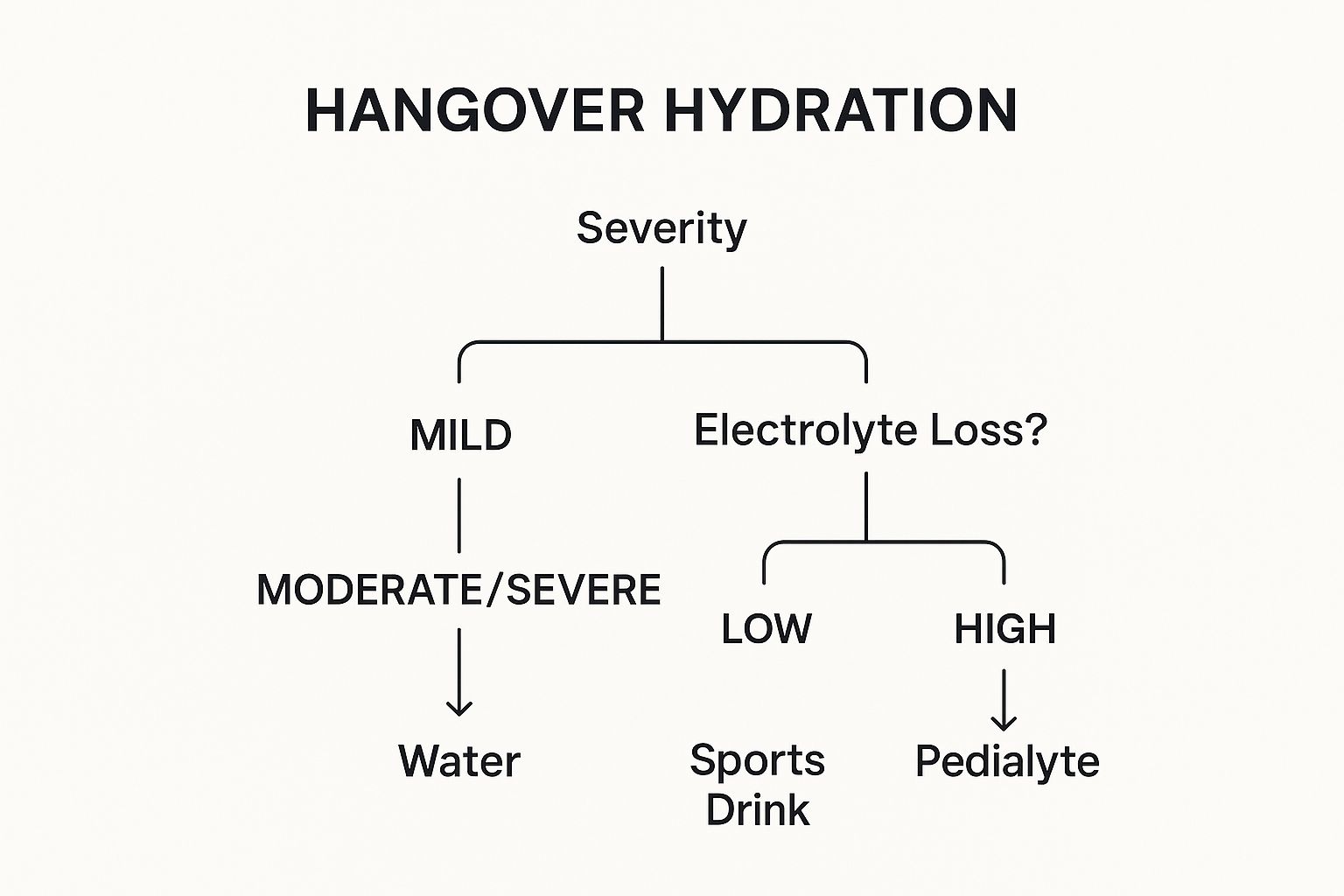
As the chart shows, Pedialyte is fantastic for severe dehydration where you've lost a lot of electrolytes, but it’s a specific tool for a specific job.
To really understand the difference, let’s look at how Pedialyte stacks up against a formula designed specifically for hangovers.
Pedialyte vs. A Comprehensive Hangover Aid
| Hangover Symptom | Addressed by Pedialyte? | Addressed by a Comprehensive Aid? |
|---|---|---|
| Dehydration | ✅ | ✅ |
| Acetaldehyde Buildup | ❌ | ✅ |
| Inflammation | ❌ | ✅ |
| Nausea & Stomach Upset | ❌ | ✅ |
| Brain Fog & Fatigue | ❌ | ✅ |
| Oxidative Stress | ❌ | ✅ |
The takeaway is pretty clear. While Pedialyte can help with one symptom, a comprehensive aid is built to handle the entire mess.
This holistic method offers a much more complete path back to feeling human again. It's not just about managing one symptom; it's about helping your body truly recover. For a deeper look into this strategy, check out our guide on how to relieve a hangover and get your body’s balance back on track.
Your Top Pedialyte for Hangover Questions, Answered
Alright, let's tackle some of the biggest questions people have when they're staring at a bottle of Pedialyte after a long night out. Getting the when and how much right is key to making it actually work for that pounding headache and dry mouth.
These are the real-deal answers you need to use it right, without going overboard.
When Should You Drink Pedialyte for a Hangover?
Timing is everything. For the best shot at feeling human, try to drink some before you go to bed and another serving as soon as you wake up.
Chugging some before you pass out helps you get a head start on the dehydration that’s coming for you overnight. Following up with another in the morning keeps the momentum going, replenishing those lost fluids and electrolytes. If you can only manage one, make it the morning one—that’s when you’ll feel the biggest relief from the worst of it.
Can Adults Drink Too Much Pedialyte?
Yes, you definitely can. While Pedialyte is generally safe for adults trying to rehydrate, it's not meant to be a replacement for water. Its formula is packed with sodium and potassium, which is great in small doses but not so great in large ones.
One or two servings to fight a hangover is usually fine. But if you start drinking it like it's water, you risk throwing your body's electrolyte balance out of whack. This is especially risky for anyone with kidney problems or high blood pressure. Think of it as a targeted tool, not an all-day beverage.
Does Pedialyte Help With Nausea?
It might help a little, but don't count on it to solve your upset stomach. If your queasiness is just a side effect of being super dehydrated, then yes, rehydrating can sometimes take the edge off.
But Pedialyte doesn’t have any active ingredients that directly fight nausea. That feeling usually comes from the alcohol itself irritating your stomach lining. For that, you need something specifically designed to calm your stomach—ingredients like ginger are scientifically proven to be way more effective.
While Pedialyte is a solid move for dehydration, a full-blown hangover is a multi-front war. Upside Hangover Jelly is built to tackle nausea, inflammation, and toxins all at once. Check out our science-backed formula at https://enjoyupside.com and feel the difference.
